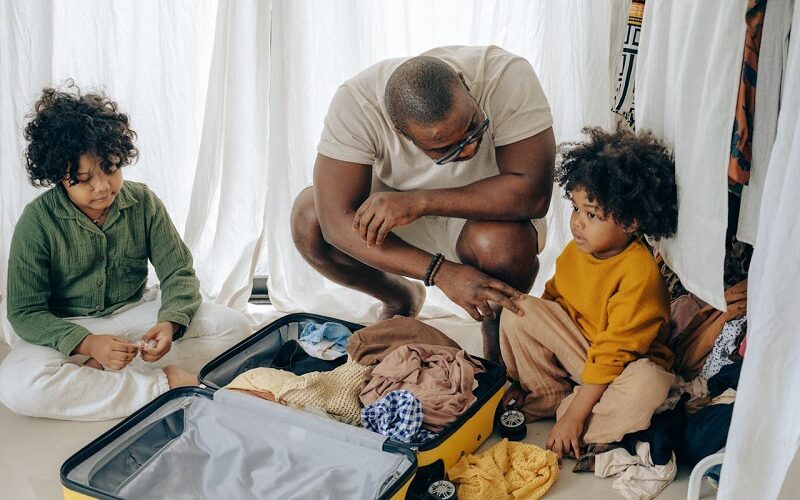When most people talk about having children, they only describe the fulfilling, joyous experience we’re conditioned to believe is normal—but that’s not the only emotion you might have about your decision to have a kid. While it’s not openly discussed as often, it’s essential to know that feeling regret after becoming a parent can happen. It’s a sensitive subject, but that doesn’t mean we shouldn’t discuss why people regret having children and how to deal with it.
It’s important to understand that feelings like this do not make someone a bad parent, and it’s more common than you might realize, especially for new moms or dads. If you regret having kids, know that you are not alone. Understanding your feelings, learning how to cope with regretting parenthood, and discovering where you can get support is crucial. The truth is, there is a lot of help out there — you just need to know where to look.
Is it Normal to Feel Regret After Having Children?
Parental regret is more common than you probably assume. Recent research suggests that as many as 7 – 8% of parents experience some type of regret after having children. You might regret having kids as a result of the massive changes and pressures that come with new parenthood. It can even be a symptom of postpartum depression (PPD). This medical condition causes intense sadness, anxiety, and exhaustion and makes it hard to care for a newborn. PPD generally happens within a few weeks after giving birth.
Online therapy for parents
Being a parent is hard. Talk to an experienced, licensed Talkspace therapist today.
Understanding Why You Feel This Way
You first need to understand why you regret having kids before you can deal with it. When you know the cause behind your feelings, you can address the issue and seek support so you can navigate your confusing emotions. It’s vital that you realize your feelings of regretting motherhood or fatherhood are normal. It’s the first step toward finding a path to emotional wellness.
Societal and cultural pressures
Society pressures and cultural norms – from the stories our grandparents tell us to the images we see on TV and in films – often paint a rosy, idyllic picture of what being a new parent is like. They all emphasize the joy and fulfillment but usually overlook the fact that parenting is hard. This idealized version of parenting can create a sense of regret when your feelings don’t match the experiences you’ve been told you should be having.
Personal expectations vs. reality
You might have dreamed about becoming a parent or envisioned what life with children would be like, but when the sleepless nights and relentless demands kick in, it’s easy to feel overwhelmed. If your parenting expectations clash with the reality you’re experiencing, it can lead to anything from disappointment to regret.
Isolation from a lack of support system
Not having support or feeling isolated can enhance feelings of regret. Being responsible for a tiny life can be overwhelming and lead to parental burnout. The job can take an emotional and physical toll on you if you don’t have adequate help addressing various parenting issues.
Loss of identity and your old lifestyle
Parenthood can require significant lifestyle changes, especially in the beginning. Where you were once only responsible for yourself and maybe an adult partner, you’ve transitioned to being in constant demand, which can cause some parents to mourn their previous lives. When the freedom you once enjoyed in your old life is suddenly out of reach for the foreseeable future, the loss can manifest as parental regret as you try to navigate your new role.
The role of mental health
Mental health is a fundamental part of how new parents cope. Postpartum depression, anxiety, depression, and other mental health conditions can intensify the feelings you might be having. Immediately addressing mental health concerns is essential, and seeking support can ensure you have coping mechanisms to improve your well-being.
“Some moms experience postpartum depression after the birth of their child that can impact their thoughts and cause feelings of regret. It’s important to seek mental health services when you start noticing symptoms of depression such as depressed mood, crying spells, loss of appetite, inability to concentrate, feelings of worthlessness, and anxiety.”
– Talkspace therapist Dr. Olga Molina, D.S.W., LCSW
7 Tips for Coping with Regret After Having Kids
Feeling regret after having children is an isolating and challenging experience. However, there are practical steps you can take to navigate your emotions so you can find balance and fulfillment in your role. The following 7 tips will help you cope with parental regret so you can embrace your journey.
Talk to a therapist
Seeking professional help from a qualified, experienced therapist can be incredibly beneficial in helping you manage any regret you might have. A therapist provides a nonjudgmental, safe place to explore what you’re feeling so you can identify the underlying causes. They can also help you develop strategies to cope with regretting motherhood or fatherhood. Therapy can also be instrumental in helping you address other mental health conditions you’re going through—like depression or anxiety—that might be contributing to your feelings.
Build a support network
Having a solid support network is essential if you’re finding parenthood difficult. Reach out to trusted family members, friends, or even local community groups to find a supportive network you can rely on. Having others to talk to, share experiences with, and rely on can make a difference.
Practice self-care and carve out time for yourself
Self-care often goes by the wayside when you’re trying to take on the all-consuming role of parenthood. However, taking care of your own needs is vital if you hope to be able to take care of anyone else. Make it a priority to do activities you enjoy that help you relax. You might read a book, practice mindfulness, go for a walk, or take a nap. Whatever you do, self-care for parents enables you to feel balanced and handle parenting better.
Communicate your feelings with your partner
Be open with your partner and share that you might regret having kids. It can strengthen your relationship and give you an ally during your darkest hour. By sharing what you’re feeling and the concerns you have, you can actually improve your relationship. Not to mention, your partner might be experiencing feelings like you, and discussing them can offer solidarity and support.
Focus on the positives of having children
Feeling overwhelmed is natural for new parents, but focusing on positive aspects can help you shift your perspective. Reflect on the joyful moments and milestones of parenting as much as possible and focus on your special bond with your child.
“The skill of reframing negative thoughts to more positive ones can be learned by talking to a therapist or participating in a support group. Seeking professional mental health services can be the key to reducing isolation and coping with regret that new moms often experience.”
– Talkspace therapist Dr. Olga Molina, D.S.W., LCSW
Set realistic expectations
Regret sometimes stems from feeling like you’re failing as a parent. Setting realistic expectations for yourself means acknowledging that perfection is unattainable. You’ll have good and bad days as a parent; this is normal and OK. Parenting is a learning process, and it’s expected to make mistakes, so be gentle with yourself. Try to reduce the pressure you place on yourself to live up to unrealistic standards so you can feel peaceful with your parenting experience.
Join parent support groups
Connecting with other parents who can relate to what you’re going through can be incredibly comforting. Find a support group you can join, either online or in person, to share your feelings and get encouragement from others.
Work Through Your Emotions with Talkspace
Parenting is complex, and regret is more normal than most people realize. It’s a valid – yet manageable – part of the parenting journey. Understanding the causes will help you take proactive steps to get through this difficult time. Talking to a therapist, building a support network, practicing self-care, and being honest with your partner are ways to challenge and overcome your feelings.
It can be frightening to feel regret about having children, but with the proper support, you can find a solution—and remember, you’re not alone. There’s hope for a brighter future in your role as a parent.
Seeking professional help is a critical first step in managing your feelings if you regret having kids. Therapy provides insights and support, teaching you coping strategies to manage your emotions effectively. Talkspace is an online platform that offers accessible and effective therapy catered to your exact needs as a parent. Explore the benefits of online therapy today and take that leap of faith. You can have a fulfilling parenting experience, and it starts with Talkspace.
Sources:
- Piotrowski K. How many parents regret having children and how it is linked to their personality and health: Two studies with national samples in Poland. PloS One. 2021;16(7):e0254163. doi:10.1371/journal.pone.0254163. https://www.ncbi.nlm.nih.gov/pmc/articles/PMC8294566/. Accessed July 24, 2024.
Talkspace articles are written by experienced mental health-wellness contributors; they are grounded in scientific research and evidence-based practices. Articles are extensively reviewed by our team of clinical experts (therapists and psychiatrists of various specialties) to ensure content is accurate and on par with current industry standards.
Our goal at Talkspace is to provide the most up-to-date, valuable, and objective information on mental health-related topics in order to help readers make informed decisions.
Articles contain trusted third-party sources that are either directly linked to in the text or listed at the bottom to take readers directly to the source.




